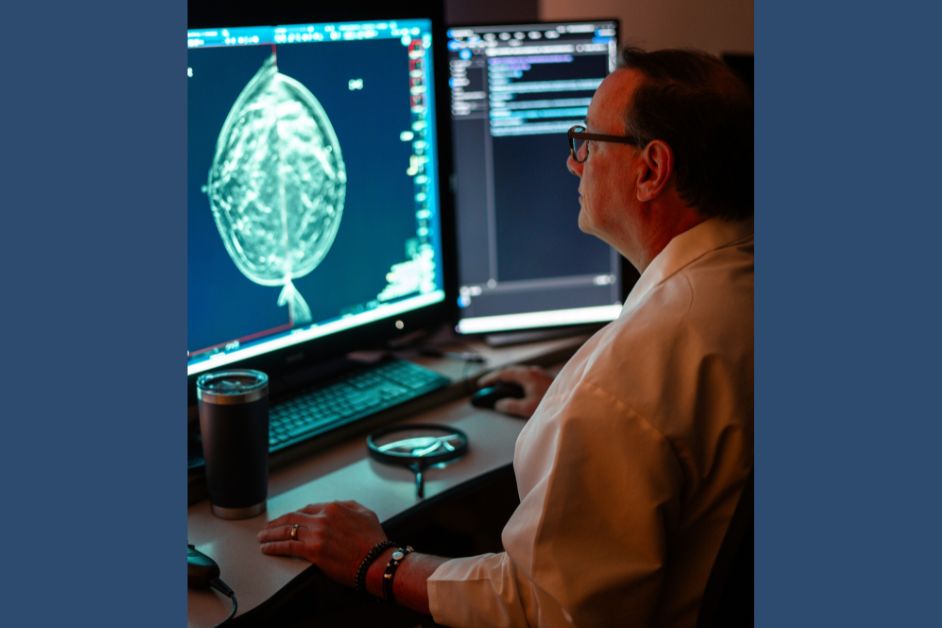Baptist Health Hardin leads first-ever 4D mammography clinical trial

A revolution in breast cancer diagnostics is underway at Baptist Health Hardin. In partnership with imaging startup Calidar Inc., a spinout from Duke University, the hospital has launched the world’s first human clinical trial of 4D mammography – a groundbreaking step in diagnostic imaging that offers hope by potentially reducing the need for painful and emotionally difficult biopsies.
The story begins not in a lab or a boardroom, but in a series of personal connections.
Tom Carrico, Vice President of Operations of Baptist Health Hardin, first learned about the 4D mammography technology through a relative connected to Dr. Stefan Stryker, who earned his Ph.D. in medical physics from Duke at just 26. Stryker, alongside his partner Dr. Josh Carpenter, formed Calidar, a company devoted to transforming imaging diagnostics.
“When I started talking to them two years ago, they were in the early stages of building a prototype that could be added onto existing 3D mammography imaging,” Tom said. “They had reached a point with their R&D where they were ready to take that to the next level, which eventually was a healthcare partner for a human trial.”
Tom and his team recognized the opportunity immediately.
“We said, ‘we’d love to be that trial,” Tom recalled.
The 4D imaging technology collects an entirely new dimension of data – the X-ray diffraction spectrum – which measures how X-rays are deflected at the molecular level. Unlike traditional 3D, this novel data measures what tissue is made of, not just what it looks like. The goal is to predict with better accuracy whether a lesion is cancerous, which would potentially eliminate the need for painful, invasive biopsies for many patients.
The study at Baptist Health Hardin is being led by led by Principal Investigator Craig Kamen, MD.
“We are excited to collaborate on this next-generation research and contribute to the development of technology that could meaningfully enhance our capabilities for diagnosing breast cancer,” Dr. Kamen said.
Tom said the trial at Baptist Health Hardin will focus on patients who have already undergone a screening and a diagnostic mammogram – typically the first two steps in detecting breast cancer. If the diagnostic imaging reveals suspicious nodules or lesions, patients are usually referred for a biopsy. In this trial, eligible patients will still undergo a biopsy but will also receive a 4D scan for comparative analysis. This analysis is what’s being studied and won’t be used for diagnostic or treatment purposes.
“We’re enrolling between 58 and 65 patients,” Tom explained. “The goal is to compare the 4D imaging results with the biopsy findings to determine just how accurately this technology can detect cancer.”
A project of this magnitude, however, doesn’t come together without strong support – particularly financial backing. That’s where Baptist Health Foundation Hardin played a crucial role, stepping in make it possible.
“We had an initial construction estimate of $55,000 to get the imaging suite ready, and in the final stage, it ended up being a $95,000 construction project,” Tom explained. “Calidar already reached their funding cap with the North Carolina Biotechnology Center. So, that’s when I went to the Foundation and asked for help.”
The Foundation board agreed without hesitation, funding the remaining costs to bring this pioneering technology to life in Hardin County.
“I’m extremely grateful to the donors,” Tom said.
This trial marks a historic moment for Baptist Health Hardin and for the region at large, proving that local dollars make a major difference.
“I think this particular project highlights the sophistication and expertise we truly have to do things that aren’t just innovative for the sake of innovation but are truly advancing patient care to the very highest level,” Tom said. “You don't have to drive to bigger cities for so many things that we can do right here.”
Tom has been with Baptist Health Hardin for 14 years, witnessing its transformation from a managed affiliate to a fully integrated member of the Baptist Health community. Over the years, he’s led multiple IT and healthcare innovation initiatives, but he’s never seen anything quite like this.
“We’ve always had strong community support and a family-like culture,” he said. “When everyone understands the ‘why’ – why we’re doing something – they rally behind it. That enthusiasm spreads, it breeds the desire to do more.”
The trial officially begins in mid-August and is expected to complete enrollment within four to six months. From there, if the results confirm what Calidar and Baptist Health Hardin hope – a strong correlation between 4D imaging and biopsy-confirmed cancer – then the technology will move into a broader human trial seeking FDA approval.
Tom hopes Baptist Health will remain at the forefront of those next steps, as well.
“We could potentially look at Louisville, Lexington, Paducah, or others who would maybe want to participate in a similar trial,” Tom said.
And with this message to donors, Tom hopes to continue earning the trust and support of the Hardin County community as Baptist Health Hardin leans into a future defined by innovation, compassion and excellent patient care:
“Put your trust in us,” he said, “because we are truly advancing care in this community.”
“We’ve always had strong community support and a family-like culture. When everyone understands the ‘why’ – why we’re doing something – they rally behind it. That enthusiasm spreads, it breeds the desire to do more.”
The Dawn of a Healthier Tomorrow
Please consider partnering with us through the power of your advocacy and philanthropy. For information on how to donate, click the link below. You may also give us a call if you have questions.

